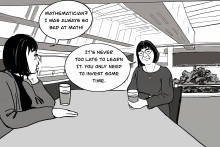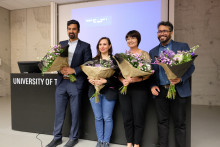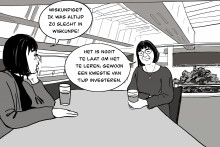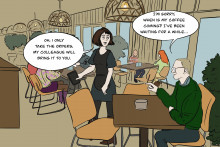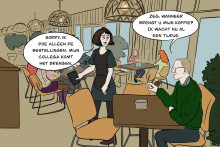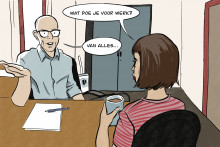When she was a little girl sitting on the bus, on her way to visit her grandparents, Nelly Litvak liked to pass the time by doing mental arithmetic. No wonder she turned out to be good at it, she says. 'If you like something, you spend more time on it and you get better at it. Anyone can learn mathematics, but you have to take the time.'
As a professor, she is now engaged in looking for connections in large quantities of data. She is leading a project to predict regional outbreaks of Covid-19 with mathematical models - an incredibly difficult, if not impossible, task. 'Policy makers want to know what the R-number in their municipality will be in a fortnight' time. But there are so many factors involved, making it extremely difficult to predict. Currently, we have forecasts for one week. We are very happy with that, but if a new measure is introduced, the behaviour of people changes and the entire situation changes.'

A mathematical model, always a simplification of reality, requires the art of selection: which factors do you include and which make the model too complicated? This can sometimes seem like guesswork, although that is not something Litvak likes to indulge in. It is precisely the desire for precision that, in her view, characterises many mathematicians. A telling anecdote is about her husband, also a mathematician, who one day claimed to have run out of eggs. Litvak, knowing this was wrong, asked him to open the fridge and say what he saw. An egg box. Litvak: 'So he says, okay, and starts frying eggs. I said, okay? Aren't you going to say I'm right? To which he replied: no, because you haven't made a statement, so you can't be right.'
She laughs at the memory, because she is the last one to get irritated by this. 'If I say something and the other person gives a counter example, or shows with arguments that I am wrong, I am glad that the error has been found. As a mathematician, you learn not to feel offended by that.' Which doesn't mean that mathematicians can have big egos either, she readily admits. 'But if something is wrong in mathematics, that's the end of the discussion, you have to admit it. Math teaches you a certain discipline.'
There are plenty of misconceptions about her field. That mathematics is all about calculating the answers to sums, for example. 'It's actually about logic, the reasoning is more important than the answer. Mathematics is actually very language-oriented, many mathematicians are not very good at mental arithmetic. They use letters in front of a number and so you get a formula, the abbreviation of a sentence. Each profession has its own terminology.'
Unfortunately, such formulas tend to intimidate people, she knows. This in turn leads to the misconception that mathematicians are much smarter than other people. 'That is such nonsense. Other professions are not easier. A cousin of my colleague has a farm in Brabant. This colleague said: when I see how much knowledge he must have about animals, plants, machines, climate, soil and business. It is so complicated! I'm glad I do mathematics, nice and simple!'



